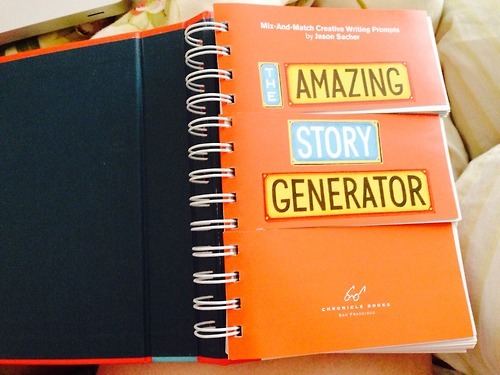slitheringink:
It’s not always what you say…
But also how you say it that defines how a character sounds. Like all things in writing, understanding and executing character voice involves a lot of mistakes and a lot practice. Out of all of the skills you can have as an author, it’s one of the most difficult to do well because, sometimes, it’s hard to make characters not all sound the same. So how do you differentiate? What are the things you need to consider when finding your character’s voice?
Know Your Character – Personality
Assuming you’ve done a fair amount of development on your character beforehand, you should know what kind of person they are, and what kind of person they will become throughout the course of your story. People can be any number of things, and have any number of traits, often shaped by their life experiences, the environment around them, the society they’re a part of, and the choices they’ve made during their lives. People can be kind, loving souls, they can be uncaring, they can be rude, and they can be downright evil. All of these things may be reflected in their speech.
In order to determine how a character may speak, ask yourself these questions:
Who is your character talking to?
Why is your character talking to that person?
What are your character’s goals? What would your character do to accomplish those goals?
Is your character being truthful when they’re speaking, or are they masking an ulterior motive?
Do their life experiences come across in their speech? Has a tragedy affected them? Has a positive event? Does their sorrow come across through in words, or do they hide it by faking another emotion? Are they sarcastic?
Do they like speaking? Are they an extrovert? An introvert? Are they being forced to speak?
Do they have a mental illness that may cause them to become withdrawn or affect another aspect of their behavior?
Know Your Character – Target
Relationships will often determine how a character speaks.
Ask yourself: who are they speaking to? Some people have no trouble speaking to anyone, even a random stranger, while for others speaking to anyone at all is very difficult. Even people who aren’t very social usually have someone they can talk to, someone they can trust. Who does your character trust? Why?
People tend to talk to close friends and family differently than they would anyone else. They tell people they’re close to their deepest secrets, their most personal flaws, and their greatest apprehensions. They may also act differently around people they trust, losing any fear that they may be judged for what they do and are free to be who they are, which they may hide from the rest of the world, for whatever reason. People who haven’t earned your character’s trust may be avoided, and when questioned your character may withhold information from them.
When speaking to a person in a position of authority, like a police officer or that character’s boss, one would generally assume that those people would be treated with respect. Of course, there are those who dislike authority of all kinds and seek to rebel against it. They may say things that get them into trouble as a result.
Know Your Character – Origin and Education
Where is your character from? What kind of education did your character receive? Cultural influences may shape your character’s beliefs, which may affect what they choose to express in their speech.
Consider:
What culture did they come from? What religion do they practice, if they practice? What beliefs does your character ascribe to? Do they live by the values of their culture or religion? Have they adopted a different culture or religion than the one they grew up with?
Do their beliefs dictate their behavior?
Are there certain aspects of their culture, of their native language, that slips into their speech?
Did their country of origin somehow limit their education? Did your character grow up with free access to information? Did your character grow up in a place with censorship?
Did your character have a traditional education? Were they tutored? Were they in a public school environment? Private school?
Does your character like to learn? Is your character book smart? Is your character street smart?
What level of education did they receive? High school? College? Trade school? Something else?
Everyone has a different level of education, and a person’s experience with language will usually influence how they form sentences and what words they decide to use. An individual with a high school education would likely speak differently than someone who’s been through college. Education also tends to have an influence on language style and whether or not someone tends to speak formally or conversationally. Of course, there are always exceptions to this. There are some incredibly well-spoken people who don’t hold degrees just as there are some terrible speakers who do.
Another thing to consider is that people who like to read, whether they’ve grown up with it or it’s something they enjoy later in life, tend to have a good understanding of language and speech patterns. Reading is a thinking process, involving more than just looking at words on a page. There’s comprehension involved, and people who read are often complex thinkers. Complex thought may translate to complex speech, but sometimes putting ideas to words is difficult, no matter what level of education a person may have.
Putting it on Paper
You should have a good idea of what causes characters to say what they say, but you’re still unsure of how to actually write it.
Let’s take a look at Kerrigore, one of the main characters in my novel. To give a little background he’s been alive for quite a while, has been screwed over by people he’s trusted many times, is generally a grump, and tends to hide behind snark and sarcasm. As such, a lot of his speech is expressed in short sentences, and though he’s certainly intelligent enough to use complex sentence structures, he doesn’t usually. It’s too much effort, though he slips when he’s irritated. He also swears a lot and tends to be impersonal to people he doesn’t know well.
In this scene, he’s talking to Kaelus, someone he’s known for a very long time, and while he doesn’t necessarily dislike her, he dislikes who she serves and what she stands for.
“What are you doing here?” he asked, kneeling down to see what had become of his wine. It had spilled out onto the kitchen floor and seeped under the fridge, bottle neck in scattered pieces. The bottom of the bottle was still intact and he picked it up, drinking the measly sip that was left and shaking it out with a frown. “Wait, never mind, you don’t do anything on your own,” Kerrigore paused to glare up at her, “What does father want?”
“For you to return home. That never changes,” she said.
“Neither does my answer.” Kerrigore gathered broken glass in his palm. Silence hung between them. He dumped the glass in the trash and tossed a dish towel on the wine, wiping it back and forth with his foot. “Like Nathriel, father can go fuck himself.”
“This grudge you hold, it destroys more than you realize,” she frowned.”
Even from that small snippet you can get a sense of character voice difference between the two of them. It’s not only accentuated by what they say, but also by their mannerisms and actions. Body language can help reveal a character’s voice as well. Irritation is clear with Kerrigore not only due to what he says, but by the fact that he’s not looking at Kaelus when he’s speaking. He’s busy cleaning up his spilled wine, allowing that to take precedent over being polite.
When writing voice, you also must be mindful of the tone of a scene. Though people may react to the same stimuli in a different manner, there is an expectation of how normal people (or what a society perceives to be normal) react under certain circumstances. For instance, most people will react to seeing a dead body with shock, and then probably remorse or at least respect for the dead. A person with more experience, a police officer or coroner for example, may still feel some form of remorse but the shock of seeing a dead human being probably isn’t there. Repetition may dull reactions but you’re going to want the character’s dialogue to reflect the serious tone of the scene.
One thing to note with tone: there are always exceptions. If it’s part of a character’s personality, tone can be intentionally broken. Just be sure the reasoning is solid.
Atypical Speech and Complex Words
Some characters use different syntax in speech. Yoda from Star Wars is a solid example of a character that uses different syntax to create a unique speech pattern. Sometimes it’s inconsistent, and sometimes it’s in an object-subject-verb order. For example: “Brave you are.” Language is always fun to play with, so don’t be afraid to experiment with word order if it would suit your character.
For Reference:
Verb Object Languages
Object Verb Languages
For some characters, more complicated is better. The best example I have is Sheldon from Big Bang Theory. He uses some incredibly complex words and sentence structures to express simple concepts in order for the writers to show the audience that he’s an intelligent character. He also tends to infuse his conversations with knowledge from areas of study like: physics, chemistry, calculus, differential equations, engineering, etc.
While complex words can serve to show intelligence (or lack of if used incorrectly), they can also express a more precise meaning for a concept. In addition, they may also make a character come off as arrogant. While the general rule with complex words is to leave them out and use something simpler so you don’t confuse readers, if it works for a character and fits with their voice, then do it.
For example: “I’m disinclined to acquiesce to your request. Means no.” – Captain Barbosa, Pirates of the Caribbean.
Complex Words with Simple Meanings:
Defenestrate – throwing something out a window.
Extirpate – destroy completely.
Disambiguate – to explain.
Antediluvian – old.
Pulchritudinous – breathtakingly beautiful.
Ameliorate – improve.
The TV Trope Spock Speak covers a lot of this well.
With speech, a lot of things you’ve heard as “rules” can be thrown out in order to create a suitable voice for a character.
In dialogue it’s okay to:
Not use contractions. This is often used to convey an intelligent or formal speaking character.
Use sentence fragments. If you sit around and listen to people actually converse, a lot of them don’t bother to talk in complete sentences, especially when talking to friends. Part of this is because someone you know, often knows what you mean, even if you don’t convey it completely.
Use slang, euphemisms, and colloquialisms.
Use catch words or phrases. Some people tend to use a certain word or phrase when they talk. That’s perfectly fine to shape a unique voice, but don’t overdo it or it may fall into cliché territory.
Use the passive voice. While generally a no-no in a narrative, passive voice is perfectly fine to use in speech. Example: “I did it” (active voice) vs. “It is done” (passive voice).
Accents and Non-English Speakers
Do not be afraid to state what kind of accent your character has. Consider country of origin, if it’s a light or thick accent, and if it’s hard or easy to understand. Count on the intelligence of your reader to recognize accents. Most people can imagine the sounds of accents like: English, French, Italian, or German if you mention it in the text. Granted, they are some of the most commonly used and sometimes stereotypically portrayed in media where people draw from, but the mental association with the sounds is there nonetheless. Uncommon accents or dialects that may not be so easy to infer might require extra description.
Again, it’s absolutely okay to say “he spoke with a thick German accent” and let the reader fill in the rest.
My opinion about the phonetic spelling of words to represent an accent comes from research and from doing such things myself when I was a beginner. For example: using words like ‘vhat’ or ‘vat’ instead of ‘what’ for a German accent. It’s annoying to read phonetics as an English speaker, and for the language being represented, it’s annoying to the native speaker to be represented in that manner. Phonetics is generally something to avoid when writing accents, even if you’ve seen it before in published books.
What about something like ebonics or a specific non-English dialect? My advice stands, as phonetic representation can sometimes come off as unintended racism especially when it’s being written from a non-native speaker perspective. This kind of thing can happen with any representation of a language that isn’t your own of course, and it’s important to be mindful of that fact.
As with any accurate portrayal, research and speaking to the people you wish to represent is key. Getting their perspective is important and the fear of misrepresentation shouldn’t stop you from including diverse characters.
That being said you can represent a non-native speaker in reasonable ways:
I know this isn’t normally the case in the United States, but in some other countries English is often taught as a second language at an early age. When representing a character speaking English as a second language, it’s important to consider how long that character has been speaking English. If it hasn’t been a long time, it would be reasonable to say that the character may slip back into his native language when speaking English becomes difficult (I’ve seen it happen here with Spanish speakers, especially kids who were born in other countries). Again, there are a lot of non-native English speakers who are perfectly proficient at the language, and even speak it better than natives. Do not fall into the stereotypical trap that non-native speakers “can’t handle English” or that their language is somehow inferior.
Emotion can play a role. Sometimes people will slip into their native languages when they are angry or distressed. Others will do it when they want to communicate something to another native speaker, and hide their words from a non-native.
It’s also important to consider the syntax of the native language. Sometimes native syntax will slip into English speech.
On that same token, sometimes native words or phrases will be used in place of English ones, especially if they’re commonly used in the character’s everyday life. For example, the character could have a relative that doesn’t speak English so he has to go back and forth between both languages.
Culture also plays a role. Different cultures have different perspectives of the world and how people should act. It is best to read articles written by natives or people who have lived in different parts of the world to get a different perspective.
Sometimes, even within the same language, there are differences. Using the United States and England for example, we both speak English but have different words for the same things. For example: we say trash in the US while rubbish is mostly commonly used in England.
Conveying Tone of Voice
I know people harp on “show, don’t tell”, but if you have the opportunity to attribute a sound or tone adjective to a character’s voice, do it. There’s nothing wrong with letting the reader in on what a character sounds like, especially when that character is first introduced or says something important that’s thematically appropriate to the tone of the scene.
Tone of voice and scene tone can go hand in hand to enhance each other, but know they are different concepts.
In order to convey tone, you can do one of these things:
Use an adjective.
Use a comparison to relate the sound of the character’s voice to one that’s easier for people to imagine.
Relate the character’s voice to a living person, if applicable.
For words to describe tone, I offer this link from the Writing Helper’s Tumblr: 55 Words to Describe Someone’s Voice.
Happy writing!
-Morgan
via:Tumblr
http://ift.tt/1trciQz












